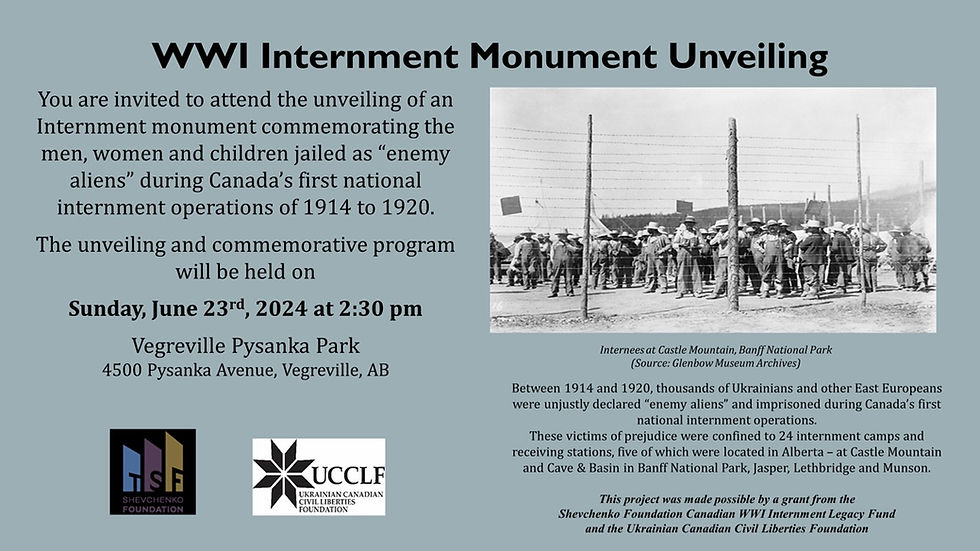Canadian Ukrainians reject Community Historical Recognition Program
- Jun 15, 2007
- 2 min read
UCCLA, For Immediate Release (Toronto, 15 June 2007)
Ukrainian Canadians have rejected the Government of Canada’s proposed Community Historical Recognition Program (CHRP), which received Treasury Board approval Thursday. The $24 million historical recognition program would oblige ethnocultural communities to apply for funding for projects aimed at recalling past government wrong doings. This fund is to be administered by the Ministry of Canadian Heritage. Over 80,000 Ukrainians were branded as "enemy aliens" during Canada's first national internment operations of 1914-1920. Almost 5,000 Ukrainians, including men, women and children, were interned as forced labourers in 24 Canadian concentration camps during and after the First World War. "People were interned not because of anything they had done, but only because of where they had come from, who they were. There was no evidence then, nor has any been found since, of divided loyalties on the part of the victims of these internment measures," said Dr. Lubomyr Luciuk, a director of the Ukrainian Canadian Civil Liberties Association. In an article published in The Toronto Star yesterday, the Ukrainian Canadian community called upon the Prime Minister to personally intervene to right this historical injustice: “We are disappointed that the Government of Canada has ignored its obligation to negotiate a settlement with the Ukrainian Canadian community,†Paul Grod, vice-president of the Ukrainian Canadian Congress, said. The Ukrainian Canadian community has called for a series of commemorative, educational and cultural initiatives to be funded through a community administered foundation, with an endowment based upon a determination of the present day value of the economic losses suffered by the community (approximately $47 million). Under the approved CHRP framework, in contrast, Ukrainian Canadians would, in effect, said Dr. Luciuk, "be required to go cap in hand to ask Ottawa to give back some of the money they took from the internees, under duress. Forcing us to do so is unconscionably paternalistic and we have said so, repeatedly, for years."
“We call upon the Prime Minister to immediately intervene to ensure a timely and honourable settlement, as mandated by the Internment of Persons of Ukrainian Origin Recognition Act, to which he gave his support in the House of Commons in March 2005, and which received Royal Assent in November 2005,†said Andrew Hladyshevsky, QC, president of the Ukrainian Canadian Foundation of Taras Shevchenko, a body created in 1963 through an Act of Parliament. He went on to say: "We would like to secure the Prime Minister’s personal assistance so that we might together craft a reconciliation settlement while the last known survivor, Mary Manko, is still alive. We believe that will reflect well upon this government's record, as did Prime Minister Mulroney's much-lauded Japanese Canadian Redress Settlement."



Comments